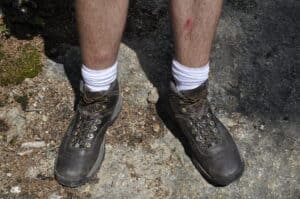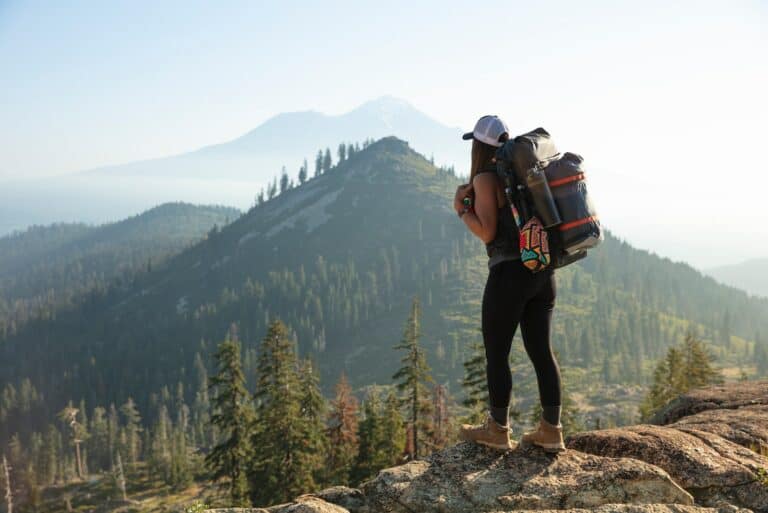I’m sure you’ve heard the saying “too much of a good thing can be bad,” but does this apply to hiking too? As an avid hiker myself, I’ve often wondered if there’s such a thing as overdoing it.
Is too much hiking bad? In this article, we’ll explore the potential downsides of excessive hiking. We’ll look at how it can impact our bodies and health, and what the experts say about it. So if you’re a hiking enthusiast like me, stick around. This might just be the insight you’ve been looking for.
Potential Downsides of Excessive Hiking

As a long-time hiker, I’ve often wondered: can you get too much of a good thing? Even something as generally healthy as hiking can have negative effects if overdone. It’s important to be aware of the potential downsides.
Overuse Injuries
Overuse injuries are likely the first thing to come to mind when we consider the negatives of excessive hiking. These injuries are usually the result of repeating the same action over and over again. Hiking falls into this category: doing it too often can lead to complains like runner’s knee, Achilles tendinitis and shin splints.
Decreased Immunity
Believe it or not, hiking too much can actually decrease your body’s immunity. The physical stress from excessive hiking can compromise your immune system, making you more susceptible to infections and diseases.
Lower Energy Levels
While moderate exercise like hiking is beneficial for energy levels, overdoing it can have the opposite effect. Fatigue, irritability and difficulty sleeping can be signs you’re pushing yourself too hard on the trail.
Overall Impact on Health
Let’s not downplay the physical demands of hiking. Long, challenging hikes require significant energy and put a lot of stress on your body. This can lead to problems such as dehydration, hypothermia, hyperthermia, and elevated heart rate.
Understanding the potential downsides of excessive hiking can help you strike a balance between reaping the benefits and avoiding overuse or injury. Keep in mind, it’s key to listen to your body: moderation and variation in your activities can go a long way towards maintaining a healthy lifestyle. It’s also crucial to follow a proper diet and hydration routine to support your hiking hobby.
It’s time to understand why these things happen. Let’s delve deep into the science behind the scenes. Here we go, a complicated but exciting journey awaits us.
Impact on our Bodies and Health

A fair warning to my fellow trekkers out there: too much hiking could have repercussions. Just as any vigorous physical activity, excessive hiking can place a toll on our bodies and overall health.
Overuse injuries are a common consequence that plagues avid hikers. Some of the most typical injuries of this sort include sprained ankles, shin splints, or stress fractures. Think of it this way: pounding the trail for hours on end is a rather taxing task for your body. Your joints, muscles, ligaments—they all bear the weight of your adventure hunger. So, it’s paramount to understand how often it’s safe to hit the trails.
We also shouldn’t forget that our immune system may struggle. Yes, routine exercise is known to fortify our immune response. Unfortunately, this doesn’t stand true when you overdo it. Research has found that prolonged periods of intense physical activities might depress our immunity.
Moreover, constantly pushing your limits can lead to decreased energy levels. When we hike a lot, we often put ourselves in a calorie deficit. This happens when the energy we use surpasses the energy we take in through food. Lasting in this state can lead to fatigue, loss of muscle mass, and, over time, a significant drop in energy and enthusiasm. It’s essential we monitor our diet while embracing the hiking lifestyle.
It’s no secret that hiking hydrates our soul, but what about our bodies? Consumption of water tends to trip us up often. Either we forget to drink throughout our hike, or we underestimate how much our body needs. Dehydration is a notorious mood killer and can cause dizziness, confusion, and even fainting fits. If left unchecked, dehydration can morph into more serious health issues. Hence, staying well-hydrated is a crucial checkpoint on your hike journey.
Bear in mind, I’m far from advising against hiking. Instead, I want us to understand that moderation is the secret. When we manage to strike the right balance, our love for hiking won’t have to clash with our health.
Expert Opinions on Excessive Hiking
Let’s see what the experts have to say about the impact of excessive hiking on the body. While hiking is indeed an excellent form of cardio, fitness, and fun, various healthcare professionals voice concerns about going overboard.
Dr. John Wilson, an avid hiker and professor of sports medicine, warns that excessive hiking can lead to overuse injuries. These might include stress fractures, Achilles tendinitis, and various other strains and sprains. Hiking aggressively without allowing ample time for recovery is a leading cause, Wilson says.
Meanwhile, Dietician Rita Anderson highlights the risks associated with poor nutrition and inadequate hydration. She states that hike-lovers often underestimate their caloric and hydration needs during strenuous climbs. Not consuming enough food and water can lead to decreased energy levels, weakened immunity, and much poorer performance.
Fitness expert Mark David cautions about the mental fatigue that can follow extreme hiking. He argues that instead of feeling rejuvenated, some people report feeling more stressed or tired after long, strenuous hikes. He suggests taking regular breaks and finding a balanced hiking routine that fits within a sustainable lifestyle.
These expert views underline that too much of a good thing can indeed become harmful. The long and short of it is: listen to your body, maintain a balanced diet and hydration regimen, and don’t push your hiking activities to excessive limits. Remember, moderation, in any form of exercise or activity, is key.
Finding the Right Balance

Establishing the perfect equilibrium while hiking isn’t just about knowing when to stop. It’s also about blending your hiking routine with rest, a well-nourished diet, and adequate hydration. Keep in mind the experts’ mantra: Moderation is key.
The danger of excess hiking creeps in subtly. First as excitement, then an obsession that leaves your body begging for relief. My advice? Don’t let it get to that point. Pay close attention to your body. If you’re feeling sluggish or if aches persist, it’s an indication to reduce your hiking intensity.
Consider making adjustments to your hiking strategy. Trying out one day of intense hiking followed by two days of rest could be an ideal start. Too ambitious? Alternate it with lighter recreational activities. This approach doesn’t merely give your body the chance to recover; it also breaks the monotony offering a sense of refreshed enthusiasm for your next hike.
Eat right and hydrate well. A protein-rich diet aids muscle repair post-hike, and sufficient intake of carbohydrates before hiking can optimize energy levels. Hydration is equally crucial. Drinking adequate water throughout your hike can keep exhaustion at bay and won’t let dehydration creep in.
Lastly, don’t feed the misconception that more hiking equals superior fitness. Quality over quantity, my hiking enthusiast! Focusing on improving your hiking skills and strength can be more beneficial, and often, it’s a more sustainable approach.
Remember, excess of anything is detrimental. Have a love for hiking? Fabulous! Just make sure the zeal doesn’t transform into an obsession that potentially harms your well-being.
Conclusion: Is Too Much Hiking Bad
So, there you have it. It’s clear that hiking is a fantastic way to boost your fitness, but like anything in life, it’s all about balance. Overdoing it can lead to exhaustion, injury, and a lack of enthusiasm. Instead, focus on improving your skills, strength, and overall hiking experience.
Remember, it’s not about hiking more, it’s about hiking smarter. Listen to your body, give it the nourishment and rest it needs, and don’t be afraid to switch things up with lighter activities. It’s these strategies that’ll keep you enthusiastic and help you reap the long-term benefits of hiking.
In the world of hiking, moderation truly is key. It’s not just about the journey, but also about ensuring you’re well enough to enjoy the view at the top. So, don’t push too hard. Remember, it’s a hike, not a race.

